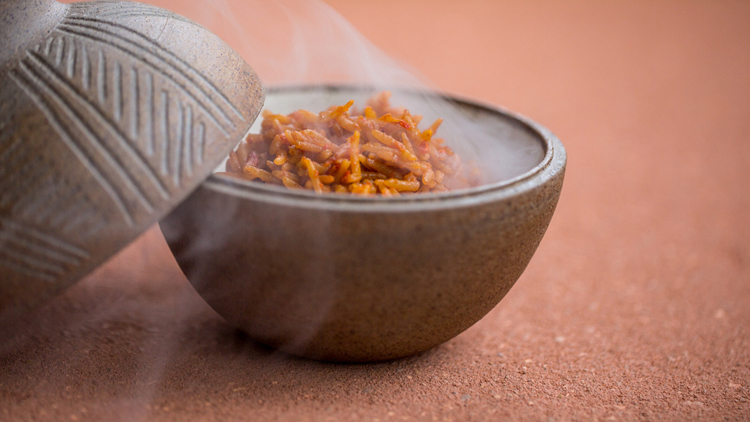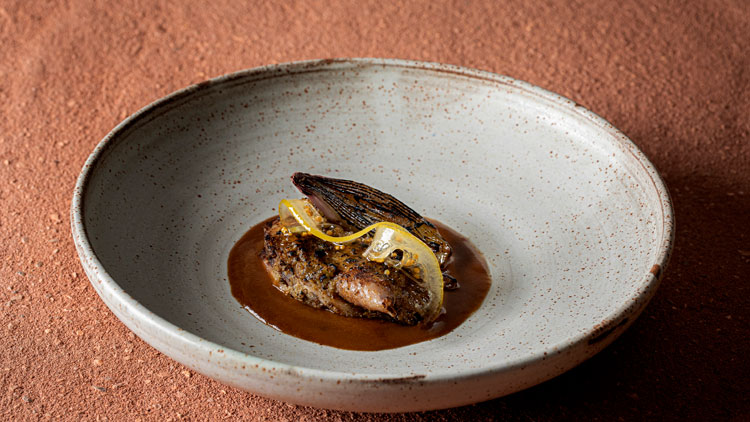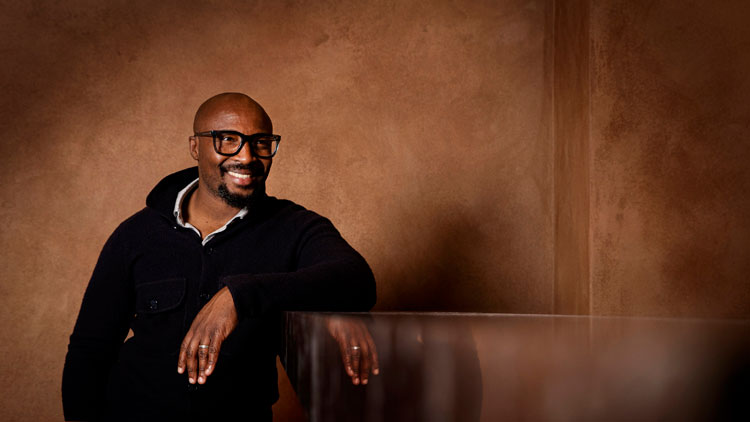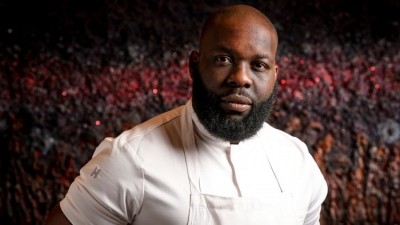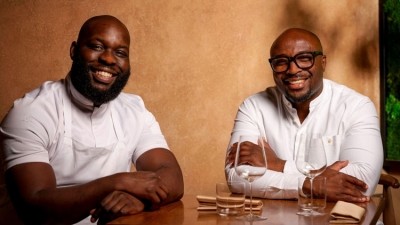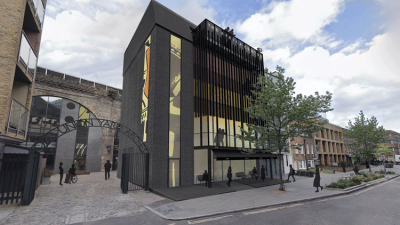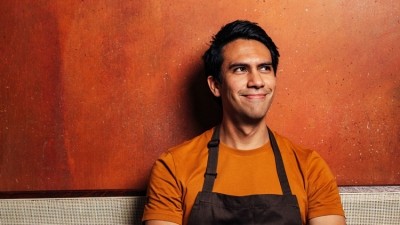The long read
Akoko: "It’s time to show people what West African cuisine is about"
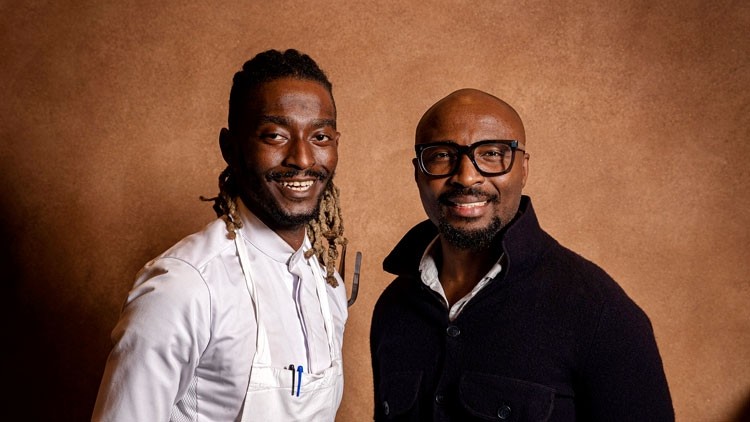
“You know, it’s a funny story,” says Aji Akokomi with a chuckle. The first-time restauranteur is sat at the window table by the entrance of Akoko, his newly opened, West African fine dining restaurant, located in the centre of Berners Street in the heart of London’s Fitzrovia.
As he recounts his tale, the open kitchen at the far end of Akoko’s dining room is abuzz. Head chef William JM Chilila, a former MasterChef: The Professionals finalist, and his brigade are getting ready for the evening service. The smells of the smoked jollof rice, cooked in a stock of sweet pepper and umami, fill the air; on the side, a tray of freshly prepped quails wait to go on the barbecue. It may be a year later than originally planned, but Akoko is finally ready to welcome its first guests.
The story Akokomi is referring to, though, dates back more than three years. It’s about 14 months since the British Nigerian first announced plans to open a West African restaurant in the capital, but the project itself has been percolating in his mind for much longer than that.
Back when he was first thinking of the idea for Akoko, which translates to ‘time’ and also ’the first’ in Yoruba, Akokomi already had a very specific idea of the sort of West African art he wanted to populate his restaurant with. With that in mind he headed to Sotheby’s on New Bond Street in Mayfair, to discuss his perspective design plans with an art dealer.
"An art dealer asked me if I was from Ikoyi. Initially, I had no idea what he meant”
“I had ideas about having these beautiful, contemporary-style African art pieces adorn the walls of my restaurant,” he says. “I was looking for things that lots of colour and presence. And it was as I was explaining this that one of the dealers turned to me and asked if I was from Ikoyi. Initially, I had no idea what he meant.”
Until that moment, Akokomi was unaware of Iré Hassan-Odukale and Jeremy Chan’s plans to turn their own West African concept – originally established as a pop-up – into a permanent venture. But soon enough, the pair had opened their doors in London’s smart St James’s Market development. Akokomi visited Ikoyi not long after it launched in 2017, and was blown away by his experience.
“It was such a beautiful space,” he recalls enthusiastically. “I remember thinking to myself ‘oh my god this is exactly how I would want my own restaurant to be’. Artistically it had its own very unique West African accent. Immediately I went back to the drawing board and begun to think about how I could make sure Akoko was different. And I hope we’ve done that.”
A singular look
In terms of visual design, Akoko is strikingly singular. While Ikoyi adopts a chic, polished look, Akoko opts for something more minimalist.
Conceived by René Dekker Design, the space is inspired by the ‘natural beauty, simplicity and earthiness’ of rural West Africa. The walls, covered in a soothing terracotta clay, are complemented by soft, gentle lighting that gives the illusion of an eternal sunset. Contemporary African art by Niyi Olagunju adorns the space, alongside ceramics inspired by the legendary West African 1960s ‘Queen of Pottery’ Ladi Kwali and mid-century modern Nupe pottery. Together with the furnishings, they offer the room various intriguing textures and shades of brown. Taking such a monochromatic approach to the design is risky, but here it works perfectly.
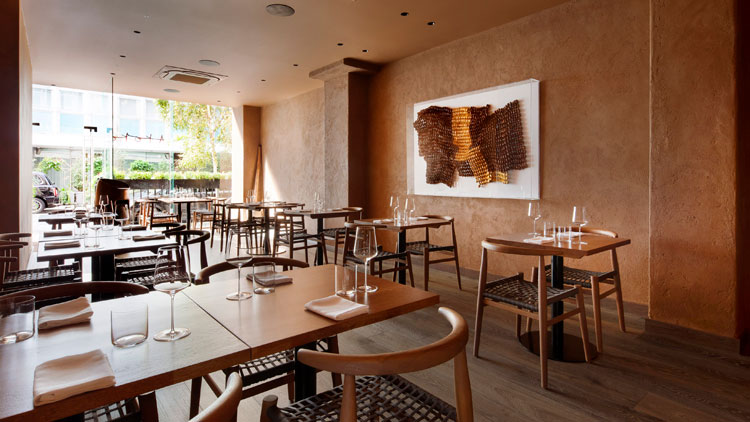
“I was trying to think of what people would expect, and I wanted to subvert that,” says Akokomi of the design. “The choosing of the art was important. We want people to immerse themselves in the stories behind the different pieces we have on display. The idea is to make our visitors feel like they’ve travelled to another part of the world when they come here.”
London calling
Akokomi has long aspired to have his own restaurant. Initially he considered opening a place over in Nigeria, where his mum owns a bakery, but having spent a long time studying in London, he soon set his heart on launching a place in the capital. From the beginning, he knew he wanted it to be a West African-focused restaurant.
“I saw a gap in the market, and I wanted to explore it,” he explains. “My idea was to create somewhere accessible that could teach people about the nuances of West African cuisine, and give it a platform that would get people’s attention. That’s why, from the beginning, I wanted the concept to be based around fine dining, because it wasn’t something that was really associated with West African restaurants in London at the time.”
There have certainly been challenges along the way, not least when it came to looking for a spot to open Akoko. As well as Fitzrovia, Akokomi considered sites in St. James’s, Mayfair and Victoria. However, securing a location was a real struggle, with many landlords and agents deeming a top-end West African as a risky venture.
“My idea was to create somewhere accessible that could teach people about the nuances of West African cuisine, and give it a platform that would get people’s attention"
Thankfully, finding a chef to work with proved to be much more straightforward. Having seen Chilila on MasterChef, Akokomi approached him, initially over Instagram, to discuss the venture.
“We really hit it off,” says Chilila, taking a break from his duties in the kitchen. Having previously spent the best part of a decade rising through the ranks at D&D London’s fancy Marylebone French spot Orrery, Akoko marks his first head chef role, and represents an opportunity to cook the sort of dishes that remain very close to his heart.
“[Akokomi] showed me what he wanted to serve, and asked me how I would refine the flavours. This is the food that I grew up eating, but it’s not something I’ve really been able to use in my cooking professionally before. Me and Aji spent months and months developing the menu, and have built up a really comprehensive book of recipes that we can always refer back to. It was a long process, but a really rewarding one.”
Telling a story
Positioning itself as a restaurant that offers a ‘progressive and elevated’ take on West African cuisine, comparisons between the food at Akoko and that at Ikoyi are perhaps inevitable, but unhelpful.
Named after a district in the Nigerian city Lagos, Ikoyi is credited with being the first in a swell of new wave West African places in the capital. Little more than a year after it opened, the celebrated West End restaurant caught the attention of Michelin and won its first star, becoming arguably the only restaurant in the world with such an accolade to truly champion indigenous ingredients from Africa; a continent that is famously under-represented and undervalued when it comes to gastronomy.
However, rather confusingly, while Ikoyi does reference some well-known staples of West African cuisine on its menu and uses plenty of spices sourced from the sub-Saharan region in its cooking, none of its dishes are direct re-imaginings of those found in West Africa; something that was a direct focus for Akokomi and Chilila.
“We want Akoko to be a steppingstone for people who maybe aren’t so familiar with West African food,” explains Akokomi. “We chose to primarily draw our inspiration from Nigeria, Ghana and Senegal; the key was to look at those different cuisines and study the similarities. Take the jollof rice, for example. It’s something that’s recognisable across all three countries, so our aim was to bring them together in one dish.”
The jollof rice is undoubtedly the centrepiece of Akoko’s launch menu. Topped with a hunk of braised then seared goat, and served amid a billowing cloud of smoke, it’s a theatrical showstopper that effortlessly manages to combine authenticity with originality.
Akoko offers diners the choice between a meaty or vegan tasting menu, both priced at a reasonable £59. The former starts with three generously-sized appetisers: Ghanaian yam croquettes with mushroom puree and truffles; grilled plantain with cashew cream and spiced peanuts; and a savoury doughnut filled with braised veal cheek. All are as satisfyingly brown and earthy as the decor, and so is much of what follows. Alongside the jollof, other dishes include Nigerian pumpkin soup with calabash nutmeg, grilled lobster, popped wild rice and moringa oil served with Guinness bread; and barbecued quail served with onions, lemon, mustard seeds, and Kani sauce. There’s also a picturesque dessert of uda-infused cream, Ghanaian cocoa butter, goat milk cream, ehuru and uziza oil.
The choice to not serve à la carte alongside, at least for the time being, is something Akokomi and Chilila agreed on early in the menu development. “Offering a tasting menu allows us to tell the story of West Africa a bit better, and take diners on a journey,” says the chef.
“If we just offered a’la carte, people would just gravitate towards the dishes they’re familiar with. This way we’re able to give people and more rounded and thorough experience of West African cuisine.”
Sourcing as close to home as possible was also of significant importance to the pair, with around 90% of the ingredients coming from the UK.
“Akoko is a West African restaurant in London, and it’s very much part of culture I grew up with to use what’s available to you close by,” says Akokomi. In Nigeria we would go to local farmers for our meat and our vegetables, and that’s exactly what we’ve done here. And for any spices, seeds or grains we can’t get hold of, we’ve done to farmers we know in Nigeria, Ghana and Senegal, and set up supply chains with them.”
Opening in a pandemic
The opening of Akoko has consistently been beset with delays. Having originally intended to open in October last year, building issues meant the launch was eventually moved to April. Then the Coronavirus hit, and put paid to those plans too. The question is, how do they feel about opening now, at what is such a volatile time for the sector?
“No one really plans to open in the middle of a pandemic”
“No one really plans to open in the middle of a pandemic,” says Chilila with a wry smile. “We talked about it delaying the opening again, but we wanted to press ahead. The last six months haven’t been stress-free by any means, but they’ve given us more time to make sure we had got everything right.
“We feel comfortable opening now. At the moment, everyone in the industry is on level playing field. We’re all working with the same constraints, and we’re all banding together to make it work as best we can.”
The wider space
London’s West African dining scene has certainly grown in strength in the years since Ikoyi first threw open its doors. This year alone has seen two prominent new names enter the fray, with Nigerian tapas Chuku’s launching its first site in Tottenham back in February. More recently, chef Adejoké ‘Joké’ Bakare turned her West African-inspired supper club-concept Chishuru into a permanent venture in Brixton Village, having triumphed in last year's Brixton Kitchen competition.
The swell of competition excites Akokomi and Chilila, who both say there’s plenty of room for new concepts in the capital’s West African restaurant space to grow.
“It’s great to see people paying more attention to these sorts of restaurants,” says Akokomi. “And there’s more to come. London is a city where you can experience cuisines and dishes from all over the world, and we’ve seen a lot of brilliant supper club-concepts that are really different to anything we’ve experienced before and want to move into permanent sites. It just shows how much potential there is in this space.”
Akokomi and Chilila have plenty of ideas for the future of Akoko, including DIY kits and cook-along sessions hosted on social media, to help enhance people’s understanding of West African cuisine from beyond the confines of the restaurant space. But what about the prospects of opening a second site?
“No way,” says Akokomi with bemusement. “This is going to be the only one, and we hope and pray that it’s a success. The challenges we’ve gone through to get here, we don’t want to throw that away. Instead, we’ll focus on always making ourselves better and improving the experience we offer.”
Chilila concurs.
“One baby’s enough,” he says with a wink. “Akoko is about changing people’s perceptions. It’s time to show people what West African cuisine is all about.”
